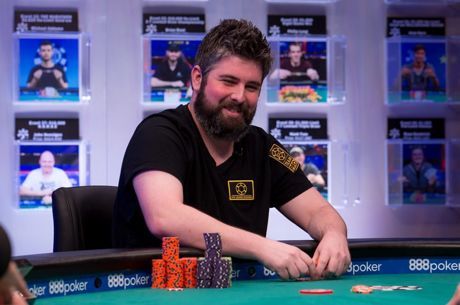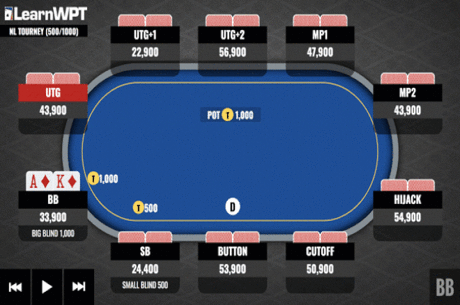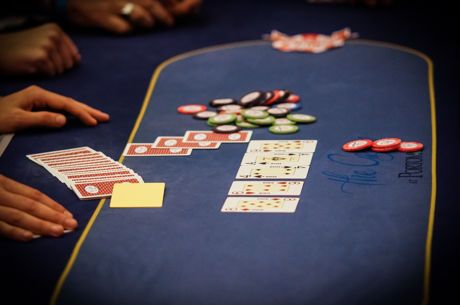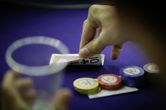When Small Bluffs Matter: A Timely Final Table Check-Raise
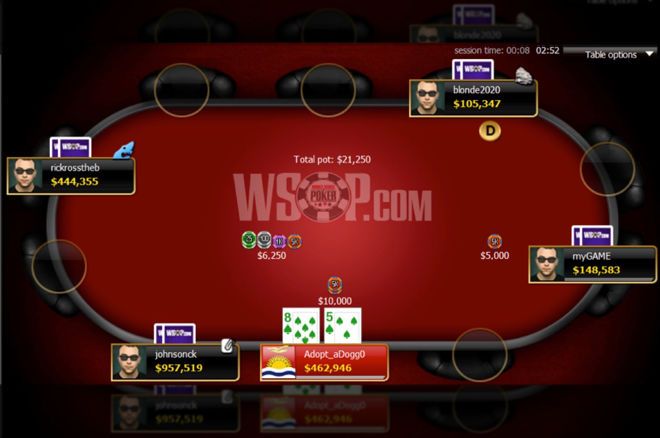
With five players left in the recent $1,000 6-Max High Roller event of the WSOP.com Online Circuit series, I played a small but pivotal pot that I think is worth discussing.
There were a lot of different dimensions to consider throughout my decision-making process in this hand, which makes it a good one to review. Even though the hand might seem like a small one on the surface, I feel that this pot was very important considering the game flow of the final table. Let me try to explain why.
The blinds were 5,000/10,000 with a 1,250 ante. The chip leader was sitting under the gun with 96 big blinds to start the hand. Meanwhile Ankush "rickrosstheb" Mandavia had 44 BBs in the cutoff, the button was the shortest stack with 10 BBs, the small blind had 15 BBs, and I was in the big blind with 46 BBs.
The remaining payouts were as follows:
- 1st - $56,202
- 2nd - $32,699
- 3rd - $18,598
- 4th - $14,510
- 5th - $12,467
The chip leader had not been applying as much pressure to the middling stacks as I felt he should have, thus opening the door for Ankush and me to try to attack and build our stacks heading into three-handed play.
Given the massive pay jumps, I feel like this was a big mistake by the chip leader. It also made any pots I played with Ankush vastly more important. Whichever one of us could separate himself from the other was going to be in a very advantageous chip position and be given the green light to open more pots and be able to build steadily without too much resistance.
As far as I know, Ankush is a fantastic no-limit hold'em tournament player. Without a doubt, he was the toughest player left at the final table, and quite possibly the absolute best player even to have registered the tournament. I knew that given the opportunity to gain a chip lead on me, he would have put me in the ICM cage and bled me dry while he built a chip lead on the way to three-handed and heads-up play�� so I had to beat him to it.
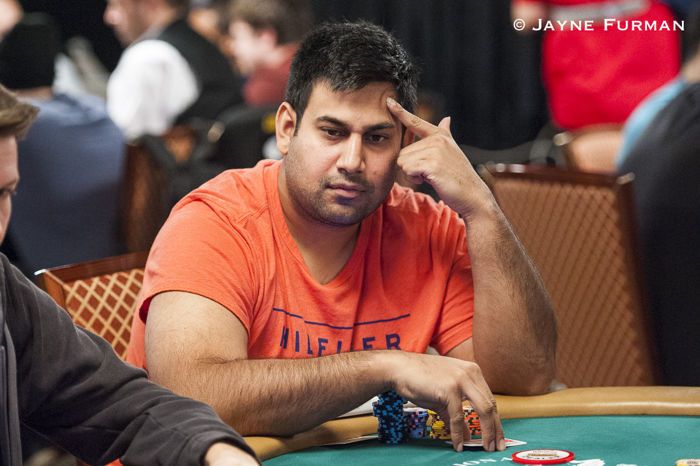
The chip leader folded UTG, then Ankush opened for 20,000 from the cutoff. The button and small blind both folded, and I defended my big blind with 8?5?.
The flop fell Q?7?7? and I checked, something I am going to do with my entire range on this board, and Ankush continued for 15,000 (less than one-third pot).
It was an interesting spot for me. Due to the game flow that I mentioned before, I instinctually wanted to go for a check-raise bluff, but first I needed to factor in some other important variables.
Let's start with a little bit of range analysis. Ankush is likely to be opening very wide here as the two short stacks have to play straightforward push-fold poker and I should be relatively tight given that I don't want to risk busting out of the tournament before those two short stacks do, especially when we consider the steep pay jumps between fifth and the top three spots.
So I put Ankush on an opening range that looks something like what is shown below (although I should preface that I am likely wrong by a small margin, and possibly wrong by a large margin):
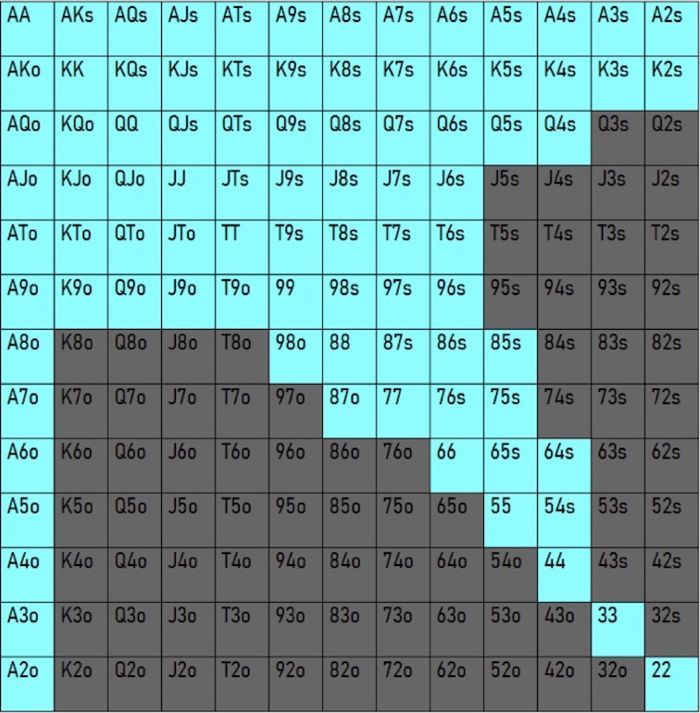
When checked to on this Q-7-7 rainbow board, inside of this specific final table dynamic I expect him to continue with all of his air, and most of his value. I imagine he has a small amount of check backs that will include his very best hands for trap (QQ, 77, Q7s, and maybe a few 7x hands), as well as a small amount of check backs to balance out his traps, likely pairs above the sevens and below the queens (88, 99, TT, JJ).
Given our best estimations of his preflop and c-bet ranges, let's take a look at the hands with which he can continue versus a check-raise. Below the sky blue hands will often be bet-folds, the purple hands can continue against a check-raise, and the yellow hands are not likely to be c-betting the flop:
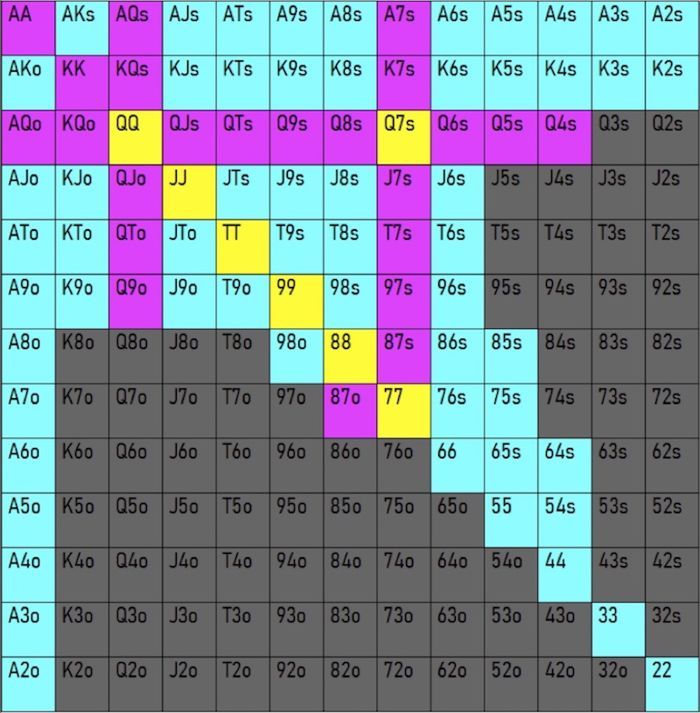
Of all the hands with which I expect him to continuation bet the flop, I think that he's going to fold upwards of 70 percent of those hands to a check-raise. Combine that with the aforementioned game flow reasoning and it seems like a great spot to go for it �� but let's still take a look at a few more variables.
We still need to consider our own hand and our own perceived range. In this situation we're going to have some �� but not a ton of �� check-raises for value. We may want to check-raise some of our 7x hands and Qx hands, thus we need to have some bluffs with which to balance.
So how do we choose the right hands to bluff? Easy �� we want hands that can improve equity on good turns. In this regard, 8?5? checks out. In fact, it's perfect. If our check-raise gets called on the flop, we improve the turn on any spade (even more so the 9?, 6?, and 4?), any six, and we also have some slight improvement on offsuit nines, eights, fives, and fours.
Our hand is the right candidate with which to bluff. The ICM pressure on our opponent is maximized. Our opponent's tendencies and frequencies dictate that this is a good bluff spot. And the game flow gives us all the reason in the world to make a play at this pot.
In other words, I'm seeing check marks in every box of the "should we run a bluff here?" checklist.
We got the bluff through, en route to winning the tournament.
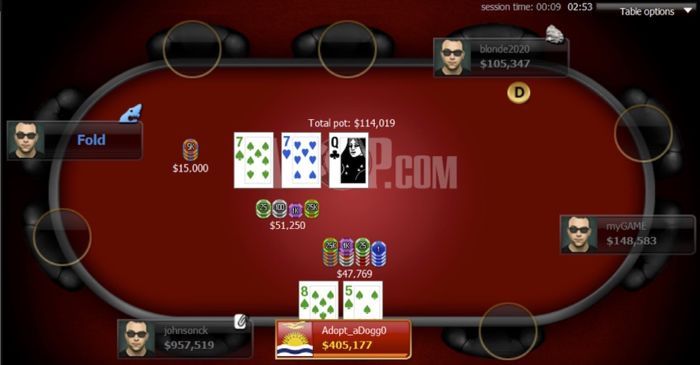
Ryan Leng is a professional poker player and coach with Chip Leader Coaching. He has played over 9 million hands of online poker, and has amassed more than $1.2 million in live tournament earnings in just the last three years, including winning one WSOP bracelet and two WSOP Circuit rings. Away from the felt, Leng spends his time with his girlfriend Nikki and their four rescue dogs. You can follow him on twitter @RyanLeng9 and check out his Twitch streams at twitch.tv/ryanlengclc.

